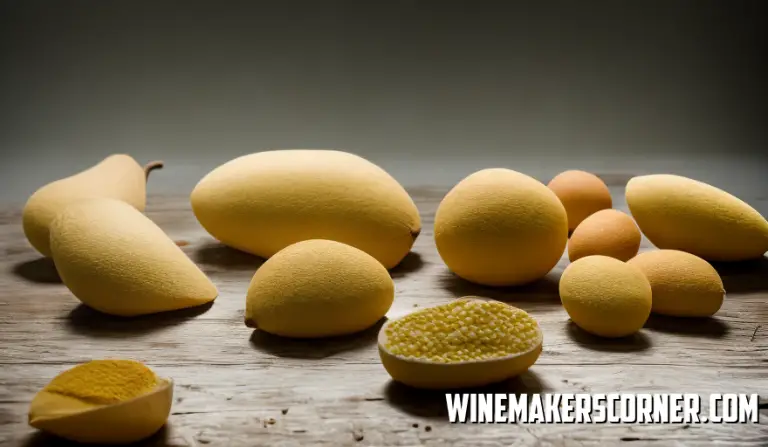The realm of winemaking is a captivating orchestration of subtle aromas, complex flavors, and time-honored customs. Yet beneath the velvety reds and crisp whites lurks a tale seldon told: one that speaks of an intense rivalry between yeast, nature’s small-scale virtuoso, and its synthetic foe potassium sorbate. So prepare yourself, esteemed lovers of wine; we’re about to embark on an intriguing voyage into the unknown territory that surrounds this enigmatic preservative- and how it influences our cherished fermented grape nectar.
Potassium Sorbate: An Overview
In winemaking, potassium sorbate is essential for controlling residual yeast activity post-fermentation. It acts by inhibiting their ability to reproduce effectively while preserving the wine’s flavor profile over time- a balance deemed crucial for ensuring quality in your precious beverage!! While some have suggested that this preservative directly kills yeast cells outright; research has shown otherwise and highlights how its primary function is suppression depending on concentration levels used during production phases. Its effectiveness though remains undisputed among winemakers who rely upon its stability properties – which protect against premature spoilage from unwanted microbial growth caused by yeast or mold – hence why caution must be exercised while utilizing this powerful ingredient in moderation without changing flavors or aromas detrimentally!!
Yeast: The Natural Fermenting Agent
Yeast: Wines’ Biological Miracle Worker
Focusing on what makes a great bottle of wine wouldn’t be complete without mentioning our industrious friend yeast! It is this tiny organism that propels grape juice through the process of fermentation creating a remarkable beverage enjoyed by millions worldwide! Fermentation depends heavily on yeast activity during this critical stage dictating desired outcomes in building great tasting wine products; without yeast we cannot fulfill this objective! Yeast consumes sugar present within grape juice; this leads to producing carbon dioxide gases and delicious intoxicating alcoholic richness felt by many who indulge.
Winemakers understand that selecting appropriate yeast strains plays an integral role in overall flavor profile development. Saccharomyces cerevisiae variety commonly gets used credited with its uniform results under varying conditions. Wild yeasts found on grape skins and vineyard settings also contribute to wines’ overall complexity and depth of character.
Winemakers face multiple challenges during fermentation that require close scrutiny to achieve the ideal expression. Precise temperature control helps strike a balance where yeast activity thrives designed to produce optimal flavor profiles while warding off undesired side effects. Stopping fermentation at the perfect moment allows for ideal alcohol levels matching with nuanced notes vital to building an outstanding bottle of wine.
Potassium sorbates use post fermentation or when stabilizing sweet wines containing residual sugar content provides opportunities for modern preservation methods; concerns about imparting undesirable flavors continue as winemakers seek harmony between natures fermenting agent (yeast) and cutting edge preservation technology like potassium sorbate.
How Potassium Sorbate Affects Yeast
Although widely employed as a preservative in the winemaking process professionals within the industry continue discussing potassium sorbates’ effects on wine quality. Potassium sorbate functions by inhibiting mold and yeast growth from taking root post bottling; nonetheless oenophiles have expressed reservations regarding this compounds role in their flagship beverages. At its core level definition wise potassium sorbate comprises a salt derived from sorbic acid frequently used throughout food and beverage operations for long term freshness storage objectives by reducing harmful microbial activity development chances. During primary fermentation stages preceding bottling yeast plays a critical role in wine creation by transforming sugar to alcohol. However.
Residues of yeast remaining post primary fermentation creates potential spoilage risks necessitating the involvement of potassium sorbate. This preservative halts further sugar breakdown through yeast activity cessation reducing the chances of unwanted secondary fermentation and ensures that desired sweetness levels can be maintained – particularly advantageous for dessert wines.
Despite its numerous benefits.
Concerns have arisen about this popular preservative methods downsides’ potential effects on overall wine quality. These may culminate in diminished taste quality due textural alterations or even an off flavor/ aroma when used excessively. Similarly. There may be impacts on beneficial bacteria within wine organisms capable of influencing malolactic fermentation (MLF) negatively.
Decreasing complexity and smoothness levels. While potassium sorbate provides crucial functions in managing yeast growth during winemaking processes for specific styles or production conditions.
It remains crucial to exercise caution in its use regarding whether it will compromise overall production quality concerning both harmful and useful microorganisms at play within each project scenarios unique factors.
Understanding the Preservative’s Role in Wine Production
Potassium sorbates’ interaction with yeast during wine production creates a captivating relationship that breathes life into the final product. To comprehend this fascinating union between these two elements better let us delve deeper!
Yeast plays an indispensable role in fermentation by converting grape sugars into alcohol – producing unique flavors and aromas that winemakers highly cherish! While at it. Potassium sorbate acts as a preservative by inhibiting spoilage organisms like mold and bacteria- which ensures no undesirable secondary fermentations occur post bottling.
Properly balancing these two substances is critical for optimal results- too little risk spoilage. While excess During primary fermentation may adversely affect proper yeast activity. Selectivity when applying it is essential; hence winemakers add potassium sorbate post primary fermentation but pre bottling as it allows yeast to complete its work while deterring unwanted microbes after bottling.
Moreover.
Residual sugar content massively affects this partnership between yeast and potassium sorbate. Sweet wine carries more residual sugar than dry wines hence requires higher concentrations of potassium sorbate to ensure zero spoilage.
In some instances. Malolactic fermentation occurs alongside primary fermentation globally- especially in red wine production.
This fermentation risks reacting with some byproducts of yeast metabolism resulting in an off putting aroma reminiscent of geraniums.
To conclude.
Comprehending the subtle relationship that exists between potassium sorbate and yeast is indispensable for optimal flavor profiles while safeguarding the wine against unwanted fermentations or spoilage post bottling.
Winemaking encompasses a beautiful blend between science, nature and human intervention!
Debunking Myths Surrounding Potassium Sorbate and Yeast
Wine enthusiasts are aware of the correlation between potassium sorbate and yeast within winemaking – sadly several myths regarding the preservative hamper its use. So lets set the record straight about its relationship with yeast and correct any misconceptions you may have around it. Firstly.
Some believe that using potassium sorbate is harmful to yeast. However. This could not be any further from the truth! When used correctly during fermentation processes enable a gentle balancing act among microorganisms; thus curbing reproduction rates. This preserves liquid quality while simultaneously minimizing spoilage risks effectively.
Secondly arises another question – whether applying this preservative could alter your fermented beverages flavour profile substantially.
On the contrary- winemakers take care never to interfere with their products’ integrity! Thus even though Potassium Sorbates near tasteless nature avoids contributing negatively towards bouquets or taste profiles and preventing off flavours entirely.
Thirdly some consumers assume all wines contain potassium sorbates nowadays – but many wine producers lean towards more natural methods such as sterilized filtration or sulfites to halt unwanted fermentation restarts during winemaking procedures.
Lastly lies one final false notion; that Potassium Sorbate represents an unnatural additive.
But lets’ clarify everything: although made synthetically for commercial purposes today; it originates from naturally occurring Sorbus Aucuparia (Mountain Ash Berries). Overall we can conclude that instead of harming yeast or affecting flavour negatively; Potassium Sorbate serves as a crucial tool in protecting wine quality in winemaking remotely. Its’ time we debunk these misunderstandings and start utilizing this preservative to its full potential within our favourite fermented beverages.
Allowing optimal enjoyment for all!
Exploring Alternatives to Potassium Sorbate in Winemaking
As a widely used preservative agent in winemaking. Potassium sorbate continues to raise questions over its potential impact on flavour and health risks. Because of this alternative methods have been explored in recent years to enhance quality and safety standards for various types of consumers. One possibility seems to revolve around the use of natural alternatives such as sulfur dioxide or SO2; a process that inhibits yeast reproduction without impacting wine taste profiles.
MLF – malolactic fermentation, from a biotechnical stance is an option emerging too that reduces acidity levels through the introduction of lactic acid bacteria while minimizing dependence on chemical based preservation methods.
Other options include cold stabilization – effective at reducing acidity levels- and advanced filtration processes eliminating undesirable sediments while promoting better longevity during storage in some cases.
Overall. There exists several different ways to approach the issue of preserving wine qualities safely while accommodating varied consumer preferences. These techniques have opened up an array of opportunities wherein producers can enhance product standards without compromising taste quality or health safety overall.
Health Implications of Potassium Sorbate Use
Use of potassium sorbate as a preservative has become a subject of debate in relation to its prolonged induction into winemaking compared to natural fermentation processes involving yeast components.
While there has been no questioning the vital role potassium sorbate plays within the process of eliminating healthy bacterial growth that results in unwanted fermentation leading to compromised quality upon consumption- it should be noted that concerns regarding health implications have arisen from over-consumption exceeding permissible levels based on regulatory standards established.
There is no denying potassium sorbates ability in promoting stable freshness after bottling, like all healthy things; it is best enjoyed with limits ensuring responsible intake that minimizes avoidable consequences attributed towards unwise consumption choices related directly or indirectly affected due to excessive exposure durations cumulatively settling- a concern noted by scientific studies examining progressive effects over time on individuals seen as being sensitive or intolerant due primarily found among those already predisposed towards sensitivities representing minority groups critical emphasizing awareness around these issues playing significant roles in making informed decisions that mitigate health risks encountered.
Yeast’s importance should not be underestimated while looking at fermentation processes integral into developing unique flavor profiles so beloved by fans globally- something achieved naturally only possible through innovative transforming grape sugars into carbon dioxide and alcohol. The significance of yeast to wine is paramount, being responsible not just for flavor profiles but also ensuring carbonation results from fermentation.
It should be noted that while most consumers tolerate yeast components well, some may experience adverse reactions such as mild bloating or digestive sensitivity issues when enjoying final products containing yeasts integral to their production practices globally.
In conclusion, responsible intake and awareness are critical regarding consumption of wine with potassium sorbate elements compared to natural yeast fermentation processes. Consistency in moderation limiting exposure that mitigates risks with additional factors related directly or indirectly is the key to uninterrupted joy awaiting many treasured memorable moments shared by vintners worldwide spanning different regions across Canada and the world in general.




